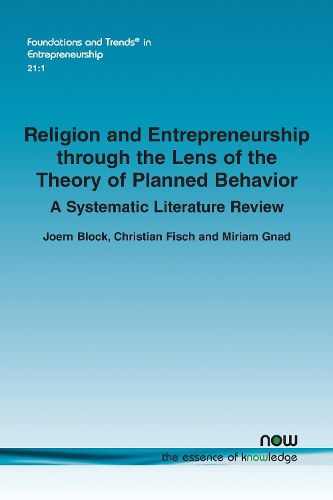Readings Newsletter
Become a Readings Member to make your shopping experience even easier.
Sign in or sign up for free!
You’re not far away from qualifying for FREE standard shipping within Australia
You’ve qualified for FREE standard shipping within Australia
The cart is loading…






This title is printed to order. This book may have been self-published. If so, we cannot guarantee the quality of the content. In the main most books will have gone through the editing process however some may not. We therefore suggest that you be aware of this before ordering this book. If in doubt check either the author or publisher’s details as we are unable to accept any returns unless they are faulty. Please contact us if you have any questions.
Research on religion and entrepreneurship has gained significant momentum, highlighting the strong connection between religious beliefs and individual career and business. However, the field lacks a comprehensive overview of the specific role religion plays in the entrepreneurial process. One of the leading theoretical frameworks for understanding behavioral processes is the theory of planned behavior (TPB), which has strong ties to entrepreneurship. Beyond using TPB to explain the entrepreneurial process, it also serves as an effective framework for organizing existing research on the intersection of entrepreneurship and religion.
The objective of Religion and Entrepreneurship through the Lens of the Theory of Planned Behavior: A Systematic Literature Review is to categorize empirical studies on religion and entrepreneurship within the TPB framework, offering a comprehensive theoretical overview of religion's role in the entrepreneurial process. In this context, we aim to address the following research question: How does religion influence the entrepreneurial process when viewed through the lens of the theory of planned behavior? To address this question, the authors conducted a systematic literature review and the findings reveal that the majority of these studies focus on how religion influences entrepreneurial attitudes, subjective norms, and perceived behavioral control. Several positive effects of religion on entrepreneurial action are identified including enhanced attitudes such as resilience and altruism, as well as improved behavioral control through better access to resources and networks. However, there are also negative consequences, particularly in terms of limited access to financing for entrepreneurs and restrictive subjective norms arising from religious beliefs disproportionately affect women entrepreneurs. Furthermore, the authors emphasize the necessity for additional research on the role of religion in shaping entrepreneurial intentions, particularly concerning its influence on the gap between intentions and actions.
The monograph is structured as follows: Section 2 introduces the systematic review methodology in terms of article identification, screening, and selection and provides a short introduction to TPB and its categories. Section 3 reviews and describes the existing literature for each TPB category. Finally, Section 4 interprets and discusses the results and highlights theoretical implications, limitations, and avenues for future research.
$9.00 standard shipping within Australia
FREE standard shipping within Australia for orders over $100.00
Express & International shipping calculated at checkout
This title is printed to order. This book may have been self-published. If so, we cannot guarantee the quality of the content. In the main most books will have gone through the editing process however some may not. We therefore suggest that you be aware of this before ordering this book. If in doubt check either the author or publisher’s details as we are unable to accept any returns unless they are faulty. Please contact us if you have any questions.
Research on religion and entrepreneurship has gained significant momentum, highlighting the strong connection between religious beliefs and individual career and business. However, the field lacks a comprehensive overview of the specific role religion plays in the entrepreneurial process. One of the leading theoretical frameworks for understanding behavioral processes is the theory of planned behavior (TPB), which has strong ties to entrepreneurship. Beyond using TPB to explain the entrepreneurial process, it also serves as an effective framework for organizing existing research on the intersection of entrepreneurship and religion.
The objective of Religion and Entrepreneurship through the Lens of the Theory of Planned Behavior: A Systematic Literature Review is to categorize empirical studies on religion and entrepreneurship within the TPB framework, offering a comprehensive theoretical overview of religion's role in the entrepreneurial process. In this context, we aim to address the following research question: How does religion influence the entrepreneurial process when viewed through the lens of the theory of planned behavior? To address this question, the authors conducted a systematic literature review and the findings reveal that the majority of these studies focus on how religion influences entrepreneurial attitudes, subjective norms, and perceived behavioral control. Several positive effects of religion on entrepreneurial action are identified including enhanced attitudes such as resilience and altruism, as well as improved behavioral control through better access to resources and networks. However, there are also negative consequences, particularly in terms of limited access to financing for entrepreneurs and restrictive subjective norms arising from religious beliefs disproportionately affect women entrepreneurs. Furthermore, the authors emphasize the necessity for additional research on the role of religion in shaping entrepreneurial intentions, particularly concerning its influence on the gap between intentions and actions.
The monograph is structured as follows: Section 2 introduces the systematic review methodology in terms of article identification, screening, and selection and provides a short introduction to TPB and its categories. Section 3 reviews and describes the existing literature for each TPB category. Finally, Section 4 interprets and discusses the results and highlights theoretical implications, limitations, and avenues for future research.